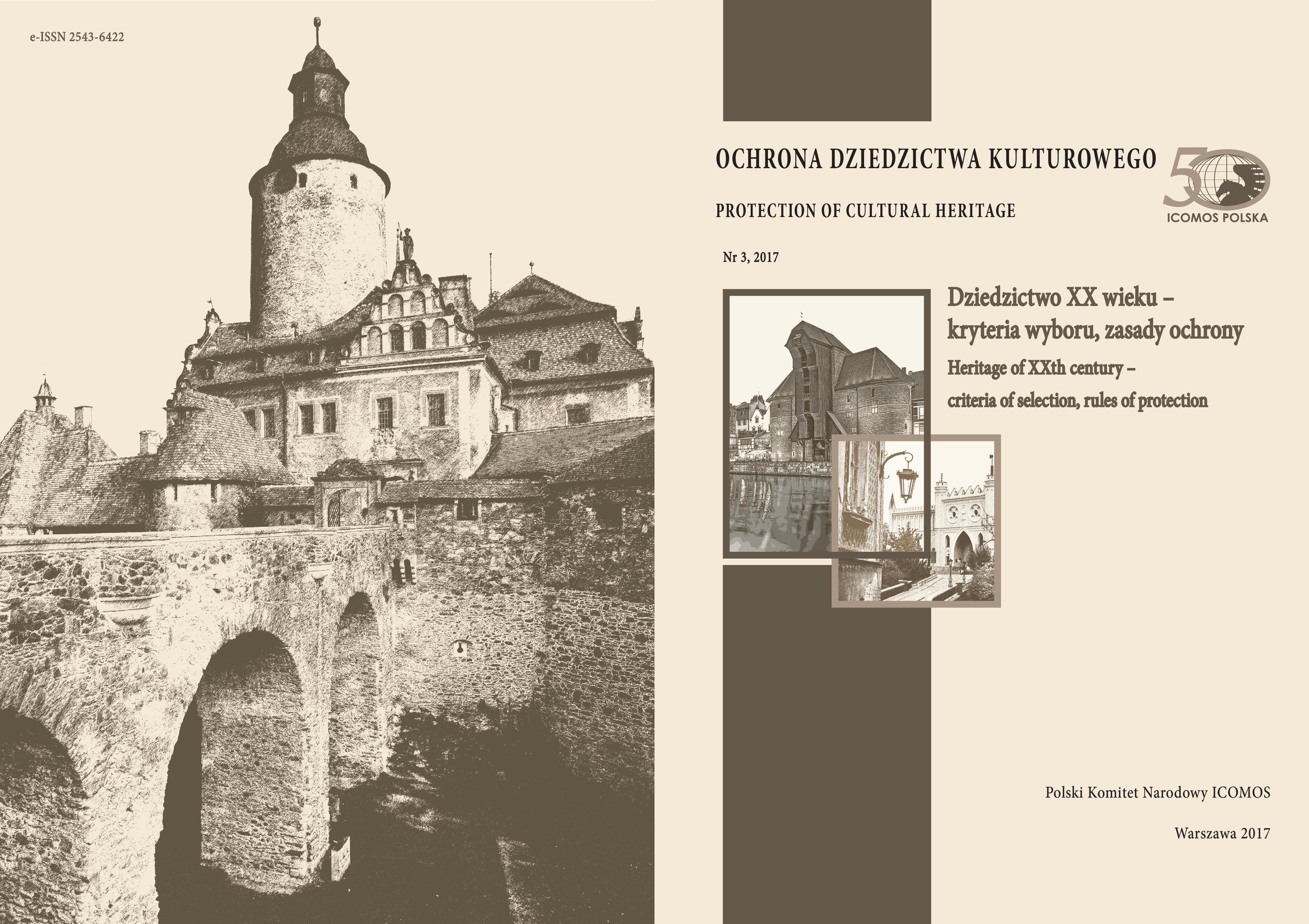Legacy of modernity in Japan - categories of valuation and examples
Article Sidebar
Issue No. 3 (2017)
-
Protection of contemporary cultural goods in Lodz planning documents - defining the resource and rules of protection
Maria Dankowska7-18
-
Conservation issues and assumptions for the protection of objects of the former KL Auschwitz-Birkenau
Jolanta Banaś-Maciaszczyk, Rafał Pióro19-28
-
Copyright protection of the 20th century cultural heritage
Wojciech Kowalski29-44
-
The legacy of post-war architecture in Poland as a record of political, social and economic changes
Małgorzata Rozbicka45-68
-
Protection of cultural goods in the 2nd half of the XXth century in Silesia. Urban design, architecture, sculpture, mural
Helena Jadwiszczok-Molencka, Jacek Molencki69-85
-
How young can a monument be? The normative premises of stating the "validity" of immovable monuments
Marek Świdrak87-94
-
Authenticity versus sharing. Boundaries of compromises in the preservation of the former Auschwitz-Birkenau camp
Anna Łopuska95-106
-
Evaluation of the value of modernism monuments from the 1st half of the XXth century. Proposals of the classification methods
Jakub Lewicki107-124
-
Modernism as a particularly important Polish 20th century heritage. Criteria for selection and protection of modernist resource on the example of Stalowa Wola architecture
Grażyna Stojak125-131
-
Searching for criteria for the evaluation of modern wall paintings in historic churches in Poland
Małgorzata Korpała133-145
-
Industrial heritage - unwated heritage - unknown heritage
Jacek Dąbrowski147-160
-
Legacy of modernity in Japan - categories of valuation and examples
Waldemar J. Affelt161-178
-
Monuments of modernism as a defined resource of architectural heritage in the context of post-war facilities protection
Maciej Czarnecki179-186
Main Article Content
DOI
Authors
Abstract
The author presents observations and information gathered during his study visit to Japan in February 2016. The Law of 30 May 1950 for the Protection of Cultural Property is outlined and formal categories of monuments are accordingly provided. The eight case studies discuss valorization of monuments based on contextual interpretation and along with their social and national significance. A non-European system of dating where timeline is divided not on centuries but by historical periods of different yearly length according to the emperor’s reign is mentioned. Special attention is given to the entry of Japanese site on the UNESCO World Heritage List in 2015, because it represents the resources of the industrial heritage from the Meiji Restoration – an eve of Modernity. Within conclusions author calls for better education of preservationists who should be familiar with humanistic dimension of their profession expressed by research not only a tangible objects but the important individuals related to the given protected site, as well.
Keywords:
References
Cultural Properties for Future Generations [online] http://www.bunka.go.jp/tokei_hakusho_shuppan/shup-panbutsu/bunkazai_pamphlet/pdf/pamphlet_en_03_ver04.pdf (dostęp: 15.03.2017).
Genzo S. Sr. And Jr. Discover the philosophy behind Shimadzu by tracing the steps of Genzo Shimadzu Jr. and Sr., who together created the company, The MOMENT [online] http://www.shimadzu.com/visionary/moment/ (dostęp: 15.03.2017).
Kimura K., Seoul’s Last-Minute Campaign to Derail Japan’s World Heritage Bid [online] http://www.nippon.com/en/currents/d00193/ (dostęp: 14.03.2017).
Konwencja ramowa Rady Europy w sprawie znaczenia dziedzictwa kulturowego dla społeczeństwa, Faro 2005.
Łukaszyński J., Inkontrologiczna koncepcja wzajemności Andrzeja Rusłana Nowickiego, „Kultura i Wartości”, nr 1 (5)/2013.
Naikai Salt Industries CO., LTD. [online] http://www.naikai.co.jp/e_gaiyou. (dostęp: 15.03.2017).
Rekomendacja UNESCO w sprawie historycznego krajobrazu miejskiego [online] http://www.unesco.pl/fileadmin/user_upload/pdf/Rekomendacje/rekomenkrajobraz.pdf.
Scott G. R., The Cultural Property Laws of Japan: Social, Political, and Legal Influences, [online] http://digital.law.washington.edu/dspace-law/bitstream/handle/1773.1/728/12PacRimLPolyJ315.pdf (dostęp: 15.03.2017).
Serafin K., Ogólna teoria wartości w filozofii Marii Gołaszewskiej, „Kultura i Wartości”, nr 4 (8) /2013.
Sites of Japan’s Meiji Industrial Revolution: Iron and Steel, Schipbuilding and Coal Mining, [online] http://www.japansmeijiindustrialrevolution.com/en/index.html (dostęp: 15.03.2017).
Vitzthum T., Fachidioten erobern die deutschen Universitäten [online] https://www.welt.de/politik/deutschland/arti¬cle146904583/Fachidioten-erobern-die-deutschen-Universitaeten.html (dostęp: 15.03.2017).
Worrall J., Le Corbusier’s Japanese ghost lives on in Ueno, The Japan Times, 20.01.2016.
Zancheti S. M., Loretto R. P., Dynamic integrity: A concept to historic urban landscap, [w:] Journal of Cultural Heritage Management and Sustainable Development 5 (1):82, Maj 2015 [online] https://www.researchgate.net/publication/277718683_Dynamic_integrity_A_concept_to_historic_urban_ landscape (dostęp: 15.03.2017).
Article Details
Waldemar J. Affelt, Gdańsk University of Technology
dr inż., st. wykładowca na Wydziale Inżynierii Lądowej i Środowiska Politechniki Gdańskiej.
Członek Głównej Komisji Konserwatorskiej. Ekspert Komisji Europejskiej ds. programu HORYZONT
2020. Prezes Stowarzyszenia Zabytkowa Gdynia. Wieloletni wykładowca, autor i moderator warsztatów
Międzynarodowej Letniej Szkoły UNESCO w Zamościu, a od 2015 r. w Lublinie. Prowadzi badania
naukowe nad dziedzictwem kulturowym techniki.






